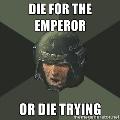| Author |
Message |
 |
|
|
 |
|
Advert
|
Forum adverts like this one are shown to any user who is not logged in. Join us by filling out a tiny 3 field form and you will get your own, free, dakka user account which gives a good range of benefits to you:
- No adverts like this in the forums anymore.
- Times and dates in your local timezone.
- Full tracking of what you have read so you can skip to your first unread post, easily see what has changed since you last logged in, and easily see what is new at a glance.
- Email notifications for threads you want to watch closely.
- Being a part of the oldest wargaming community on the net.
If you are already a member then feel free to login now. |
|
 |
![[Post New]](/s/i/i.gif) 2016/11/23 18:23:40
Subject: Re:The Ultimate Condemnation of WH40k's Rules
|
 |

Longtime Dakkanaut
Ute nation
|
tneva82 wrote:
Good dice yes. Bad dice while random not even distribution. If it was 100% random every result would be 1/6 times. Bad dices have different distribution.
That is not how random works, true random is lumpy, if you rolled a die 66 times and got each result 11 times, that would be one of the least statistically probable outcomes. The most likely outcome is that most of the numbers are within +/- 2 from 11. When we do math-hammer we are determining the mean, with the understanding that the results will likely be within a Standard deviation or two of that number (ala a bell curve). If you are interested in determining if your dice are fair here is a stack exchange article on how to do it:
http://rpg.stackexchange.com/questions/70802/how-can-i-test-whether-a-die-is-fair
|
Constantly being negative doesn't make you seem erudite, it just makes you look like a curmudgeon. |
|
|
 |
 |
![[Post New]](/s/i/i.gif) 2016/11/23 18:33:52
Subject: The Ultimate Condemnation of WH40k's Rules
|
 |

Omnipotent Necron Overlord
|
ERJAK wrote: MarsNZ wrote: MarsNZ wrote: malamis wrote: malamis wrote:
Do you really want to turn your dudesmen into Magic:The Gathering where everything is razor edge balanced against everything else, and the random chance factor is the only possible hope of winning even a slightly unfavorable matchup?
Is that how Chess works? No, skill is a factor that your false equivalence totally ignores.
white wins 56% of the time in professional games. The near perfect balance of the rest of the game makes first turn advantage the be all end all
Kinda like 40k except first turn is probably a 65% advantage.
|
If we fail to anticipate the unforeseen or expect the unexpected in a universe of infinite possibilities, we may find ourselves at the mercy of anyone or anything that cannot be programmed, categorized or easily referenced.
- Fox Mulder |
|
|
 |
 |
![[Post New]](/s/i/i.gif) 2016/11/23 18:47:25
Subject: The Ultimate Condemnation of WH40k's Rules
|
 |

Legendary Dogfighter
|
And you can even build armies around yielding the 1st turn advantage.
It's a big part of why DftS has no place in tournament play, obsec hover flyers just win if they go second.
|
Some people find the idea that other people can be happy offensive, and will prefer causing harm to self improvement. |
|
|
 |
 |
![[Post New]](/s/i/i.gif) 2016/11/23 19:16:14
Subject: Re:The Ultimate Condemnation of WH40k's Rules
|
 |

Confessor Of Sins
|
 Grimgold wrote: Grimgold wrote:tneva82 wrote:
Good dice yes. Bad dice while random not even distribution. If it was 100% random every result would be 1/6 times. Bad dices have different distribution.
That is not how random works, true random is lumpy, if you rolled a die 66 times and got each result 11 times, that would be one of the least statistically probable outcomes. The most likely outcome is that most of the numbers are within +/- 2 from 11. When we do math-hammer we are determining the mean, with the understanding that the results will likely be within a Standard deviation or two of that number (ala a bell curve). If you are interested in determining if your dice are fair here is a stack exchange article on how to do it:
http://rpg.stackexchange.com/questions/70802/how-can-i-test-whether-a-die-is-fair
I think the point they were making is that if you have a thing with 6 different possible results, the fact that one of those possible results happens 26% of the time over 1,000 rolls doesn't mean that the thing you're doing is any more or less random than if each result happened 16.7% of the time over 1,000 rolls. It just means that the probability of that random result is 26%, not 1 in 6. Full stop.
|
|
|
 |
 |
![[Post New]](/s/i/i.gif) 2016/11/23 19:44:23
Subject: Re:The Ultimate Condemnation of WH40k's Rules
|
 |

Courageous Space Marine Captain
|
 Pouncey wrote: Pouncey wrote:
Well, what I did was sit down at my dining room table with a single scatter die, closed my eyes, and just started shaking the die in both of my hands, which were closed enough to stop it from bouncing out, but open enough the die was moving around in there a lot. While continuing to do so, I repeated in my mind the term "dead-on" over and over and over, referring to the direct hit marker present on two of six faces. Eventually, at some random moment, I would feel a sudden sense of utter and total peace and calm, and at that moment, I would roll the die without any special hand movement, just the way an ordinary roll would be. And the die ended up with the direct hit symbol up.
Then I did the same thing 14 more times consecutively, and each and every time it would end up with a direct hit symbol up. At this point I considered it proven to myself that I could do it, though the math tells me the odds of 15 consecutive 1 in 3 chances all being the same (3 to the fifteenth power) means the odds of this happening by random chance was 1 in 14,348,907. I know the die was not loaded, as I tested this after those 15 consecutive direct hits by just rolling it a few times normally with no attempt whatsoever to control the results, and it was able to roll scatter symbols.
Is this a joke or do you seriously think you have magical powers?
|
|
|
|
 |
 |
![[Post New]](/s/i/i.gif) 2016/11/23 20:41:47
Subject: Re:The Ultimate Condemnation of WH40k's Rules
|
 |

Longtime Dakkanaut
Ute nation
|
 Pouncey wrote: Pouncey wrote:
I think the point they were making is that if you have a thing with 6 different possible results, the fact that one of those possible results happens 26% of the time over 1,000 rolls doesn't mean that the thing you're doing is any more or less random than if each result happened 16.7% of the time over 1,000 rolls. It just means that the probability of that random result is 26%, not 1 in 6. Full stop.
If you roll d6 a thousand times, and a single number comes up 26% of the time, the probability of that die being random/fair is less than 1 in 10,000. So to respond to that statement in an unambiguous manner, a number coming up 26% of the time on a D6 is far less random than a that number coming up 16.7%.
|
Constantly being negative doesn't make you seem erudite, it just makes you look like a curmudgeon. |
|
|
 |
 |
![[Post New]](/s/i/i.gif) 2016/11/23 20:54:26
Subject: Re:The Ultimate Condemnation of WH40k's Rules
|
 |

Confessor Of Sins
|
 Crimson wrote: Crimson wrote: Pouncey wrote: Pouncey wrote:
Well, what I did was sit down at my dining room table with a single scatter die, closed my eyes, and just started shaking the die in both of my hands, which were closed enough to stop it from bouncing out, but open enough the die was moving around in there a lot. While continuing to do so, I repeated in my mind the term "dead-on" over and over and over, referring to the direct hit marker present on two of six faces. Eventually, at some random moment, I would feel a sudden sense of utter and total peace and calm, and at that moment, I would roll the die without any special hand movement, just the way an ordinary roll would be. And the die ended up with the direct hit symbol up.
Then I did the same thing 14 more times consecutively, and each and every time it would end up with a direct hit symbol up. At this point I considered it proven to myself that I could do it, though the math tells me the odds of 15 consecutive 1 in 3 chances all being the same (3 to the fifteenth power) means the odds of this happening by random chance was 1 in 14,348,907. I know the die was not loaded, as I tested this after those 15 consecutive direct hits by just rolling it a few times normally with no attempt whatsoever to control the results, and it was able to roll scatter symbols.
Is this a joke or do you seriously think you have magical powers?
No, I don't believe I have magical powers.
The best explanation I can come up with is that somehow my brain calculated what the result would be of me rolling the die and expressed conditions favorable to the result I wanted by creating a sense of peace and calm.
If that's not it, then my explanation is "I don't know how I did that." Automatically Appended Next Post:  Grimgold wrote: Grimgold wrote: Pouncey wrote: Pouncey wrote:
I think the point they were making is that if you have a thing with 6 different possible results, the fact that one of those possible results happens 26% of the time over 1,000 rolls doesn't mean that the thing you're doing is any more or less random than if each result happened 16.7% of the time over 1,000 rolls. It just means that the probability of that random result is 26%, not 1 in 6. Full stop.
If you roll d6 a thousand times, and a single number comes up 26% of the time, the probability of that die being random/fair is less than 1 in 10,000. So to respond to that statement in an unambiguous manner, a number coming up 26% of the time on a D6 is far less random than a that number coming up 16.7%.
So you're saying that GW dice aren't really random, but casino dice are random?
|
|
This message was edited 1 time. Last update was at 2016/11/23 20:55:23
|
|
|
 |
 |
![[Post New]](/s/i/i.gif) 2016/11/23 20:59:26
Subject: The Ultimate Condemnation of WH40k's Rules
|
 |

Nasty Nob
Crescent City Fl..
|
A good friend of min rolls casino dice for 40K. I have no idea if it actually get him averages or not. I on the other hand roll GW little red dice collected from their boxed sets over the last ...20 years.
Which I am told are the absolute worst dice, according to some study using a micrometer I read about a few years back. I have just over 60 of them. They give and they take. And it is for them to know which and when...
|
The rewards of tolerance are treachery and betrayal.
Remember kids, Games Workshop needs you more than you need them. |
|
|
 |
 |
![[Post New]](/s/i/i.gif) 2016/11/23 21:06:33
Subject: The Ultimate Condemnation of WH40k's Rules
|
 |

Longtime Dakkanaut
Ute nation
|
If GW dice aren't random I don't think any of us would be too surprised, they are cheap plastic dice made by the lowest bidder. Casino dice in las vegas not being random would probably be a felony, so I would assume batches of them are periodically tested, and thus more random than GW dice.
|
Constantly being negative doesn't make you seem erudite, it just makes you look like a curmudgeon. |
|
|
 |
 |
![[Post New]](/s/i/i.gif) 2016/11/23 21:13:14
Subject: The Ultimate Condemnation of WH40k's Rules
|
 |

Confessor Of Sins
|
 Grimgold wrote: Grimgold wrote:If GW dice aren't random I don't think any of us would be too surprised, they are cheap plastic dice made by the lowest bidder. Casino dice in las vegas not being random would probably be a felony, so I would assume batches of them are periodically tested, and thus more random than GW dice.
GW dice are random though.
I mean, if you look at MMORPGs with loot that drops randomly, no one thinks the random number generator controlling dropped loot isn't random when you have different percentages of probability for different pieces of loot. No one looks at the loot table for one of the raid bosses, Garrosh Hellscream:
http://www.wowhead.com/npc=71865/garrosh-hellscream
And thinks it's even weird that his 26 possible pieces of loot he can drop have drop chances ranging from 3% to 39%. No one thinks that the random number generator controlling the drop rate of his loot isn't random because of that.
|
|
|
 |
 |
![[Post New]](/s/i/i.gif) 2016/11/23 21:40:43
Subject: The Ultimate Condemnation of WH40k's Rules
|
 |

Longtime Dakkanaut
Ute nation
|
You're conflating two different things, to use the wow example:
Wow loot tables are actually several rolls depending on difficulty and loot settings, but we will simplify it for the sake of argument and say every item that drops is determined by a single loot table with a random number generator creating an integer (IE: whole number) between 1 and 100. The items have ranges that if the random number is within then that's the item that drops. 1-3 is boots of ummie stompin 4-11 is the axe of being large enough to look like you're compensating for something, 12 is ultra rare trinket someone is going to drop a years of DKP on, and etc.
The number generated is random we can't predict it, it can be anything between 1 and 100. The results however are probabilistic, I know that the axe is 8 times more likely to drop than the trinket. This only works when the RNG is random otherwise it will alter the probabilities in undesired ways. If the RNG was 10 times as likely to roll a 12 as an 11, the probability of the trinket dropping goes above the 1% that was intended, and the axe below the 8% that was intended.
40k and games of it's ilk are the same animal as this, probabilistic layers over random number generators called dice. I don't know what number will come up on a single D6 roll but I know that a space marine shooting is twice as likely to hit as to miss (1-2 misses 3-6 hits).
|
Constantly being negative doesn't make you seem erudite, it just makes you look like a curmudgeon. |
|
|
 |
 |
![[Post New]](/s/i/i.gif) 2016/11/23 21:42:13
Subject: The Ultimate Condemnation of WH40k's Rules
|
 |

Wicked Warp Spider
|
But does the question if GW dice not being perfectly random has any in-game meaning at all? You're rolling hundreds dice per game, some of those rolls rely on high results, some on low results (and which of those are for your benefit are reversed when your opponent rolls his dice). So any unfairness of dice used largely counters itself during the game.
In casinos however, outcome of the game rely heavily on single throws, so you have to have perfect dice not to create a bias in favour or against the casino.
If number of different rolls with biased dice has in fact a statistical importance in winning or loosing in 40K, and those chessex-type dice really favour '1' 26% of time, then you should really consider playing low-morale army with a lot of blast weapons, as they will benefit the most from lots of '1' results.
Interesting problem arises if you and your opponent both use different dice, one biased set and one fair. To realy answer if this in fact give you any advantage, you should really measure how important a single die roll in 40K really is (not in a "peak moment", but over large number of battles with varying forces and varying scenarios).
One question about this study mentioned earlier - was this a finding, that every chessex dice favoured '1's or that every dice favoured one of possible results up to 26% bias?
|
|
This message was edited 1 time. Last update was at 2016/11/23 21:44:32
|
|
|
 |
 |
![[Post New]](/s/i/i.gif) 2016/11/23 21:51:07
Subject: The Ultimate Condemnation of WH40k's Rules
|
 |

Confessor Of Sins
|
 Grimgold wrote: Grimgold wrote:You're conflating two different things, to use the wow example:
Wow loot tables are actually several rolls depending on difficulty and loot settings, but we will simplify it for the sake of argument and say every item that drops is determined by a single loot table with a random number generator creating an integer (IE: whole number) between 1 and 100. The items have ranges that if the random number is within then that's the item that drops. 1-3 is boots of ummie stompin 4-11 is the axe of being large enough to look like you're compensating for something, 12 is ultra rare trinket someone is going to drop a years of DKP on, and etc.
The number generated is random we can't predict it, it can be anything between 1 and 100. The results however are probabilistic, I know that the axe is 8 times more likely to drop than the trinket. This only works when the RNG is random otherwise it will alter the probabilities in undesired ways. If the RNG was 10 times as likely to roll a 12 as an 11, the probability of the trinket dropping goes above the 1% that was intended, and the axe below the 8% that was intended.
40k and games of it's ilk are the same animal as this, probabilistic layers over random number generators called dice. I don't know what number will come up on a single D6 roll but I know that a space marine shooting is twice as likely to hit as to miss (1-2 misses 3-6 hits).
Correct.
So just because a 1 statistically comes up 26% of the time on a GW-brand D6 doesn't mean GW dice aren't random. Automatically Appended Next Post: nou wrote:But does the question if GW dice not being perfectly random has any in-game meaning at all? You're rolling hundreds dice per game, some of those rolls rely on high results, some on low results (and which of those are for your benefit are reversed when your opponent rolls his dice). So any unfairness of dice used largely counters itself during the game.
In casinos however, outcome of the game rely heavily on single throws, so you have to have perfect dice not to create a bias in favour or against the casino.
If number of different rolls with biased dice has in fact a statistical importance in winning or loosing in 40K, and those chessex-type dice really favour '1' 26% of time, then you should really consider playing low-morale army with a lot of blast weapons, as they will benefit the most from lots of '1' results.
Interesting problem arises if you and your opponent both use different dice, one biased set and one fair. To realy answer if this in fact give you any advantage, you should really measure how important a single die roll in 40K really is (not in a "peak moment", but over large number of battles with varying forces and varying scenarios).
One question about this study mentioned earlier - was this a finding, that every chessex dice favoured '1's or that every dice favoured one of possible results up to 26% bias?
26% of results being 1 was the average across GW dice. The results for individual dice varied wildly, some rolled 1s lower than 16.7% of the time, others rolled 1s up to, I think it was 32% of the time?
Also, the study involved each die being tested being rolled 1,000 times each. So the question of "Doesn't it average out to even over a large number of rolls?" has already been answered by, "This was already tested over a large number of rolls."
|
|
This message was edited 1 time. Last update was at 2016/11/23 21:54:09
|
|
|
 |
 |
![[Post New]](/s/i/i.gif) 2016/11/23 22:09:19
Subject: The Ultimate Condemnation of WH40k's Rules
|
 |

Courageous Space Marine Captain
|
If the study people have been talking about is the one floating around in the net I've seen, I really don't believe it. Either it was a fluke or there was a systemic error. A lot of people have ran their own tests and come with results that pretty much match the expected random distribution. If ones were really 1.5-2 times more common as they should people would know.
|
|
|
|
 |
 |
![[Post New]](/s/i/i.gif) 2016/11/23 22:24:52
Subject: The Ultimate Condemnation of WH40k's Rules
|
 |

Confessor Of Sins
|
 Crimson wrote: Crimson wrote:If the study people have been talking about is the one floating around in the net I've seen, I really don't believe it. Either it was a fluke or there was a systemic error. A lot of people have ran their own tests and come with results that pretty much match the expected random distribution. If ones were really 1.5-2 times more common as they should people would know.
He did that study to put it to the ultimate test whether the claims that already existed about people's GW dice rolling 1s more often than normal were true or not.
People already knew that 1s came up more often than they should. The study was done to show whether that was actually true or not.
And calling it a fluke is not reasonable. It involved a total of tens of thousands of dice rolls to prevent the results from being a fluke.
|
|
|
 |
 |
![[Post New]](/s/i/i.gif) 2016/11/23 22:47:47
Subject: The Ultimate Condemnation of WH40k's Rules
|
 |

Stalwart Ultramarine Tactical Marine
|
Link to this study with thousands of dice rolls? Honestly, the problem with 40k isn't dice, it's the rules. Besides, if dice really were that big of an issue, every tournament should issue standard dice so that everyone is on the same playing field. If you're that worried about dice, just share the same pool so that both you and your opponent have the same chances of drawing "bad" dice. Personally, I think the results are negligible and I have done a dice test myself using chi squared tests. You can view the results here: http://www.miniwargaming.com/forum/viewtopic.php?p=1033836#p1033836
|
|
This message was edited 2 times. Last update was at 2016/11/23 22:53:16
|
|
|
 |
 |
![[Post New]](/s/i/i.gif) 2016/11/23 22:59:55
Subject: The Ultimate Condemnation of WH40k's Rules
|
 |

Stealthy Kroot Stalker
|
 Pouncey wrote: Pouncey wrote: Crimson wrote: Crimson wrote:If the study people have been talking about is the one floating around in the net I've seen, I really don't believe it. Either it was a fluke or there was a systemic error. A lot of people have ran their own tests and come with results that pretty much match the expected random distribution. If ones were really 1.5-2 times more common as they should people would know.
He did that study to put it to the ultimate test whether the claims that already existed about people's GW dice rolling 1s more often than normal were true or not.
People already knew that 1s came up more often than they should. The study was done to show whether that was actually true or not.
And calling it a fluke is not reasonable. It involved a total of tens of thousands of dice rolls to prevent the results from being a fluke.
People didn't already "know" that 1s came up more often than they should, people FELT that 1s came up more often than they should - itself not a terribly convincing argument, given the way people psychologically process and interpret past events.
Increasing the dice pool in tests makes it LESS LIKELY that it is a fluke. It does not prevent a fluke, because a fluke by its nature is an unusual event.
Most scientific studies look for a p value of .05 or less, which translates to a 5% or less chance that the results of the study are the unusual but predictable spikes of off-average values, rather than being within the expected range of average values. The general relationship between number of tests and p value is inverse correlation: the higher the number of tests, the lower the p value (and thus the more likely the test's result is reflective of the result expected in reality).
Whether it is reasonable to presume this study is a fluke depends on circumstantial factors, like the results of other tests (and their own P-value) - if the "26%" result only occurred in this study, and every other study resulted in something far closer to the expected 16.7% result if the dice were balanced, then it would be reasonable to presume this study was a fluke (either because the dice were just insanely cold that day, or because the set[s] of dice tested came from a particularly badly balanced batch).
However, if other studies also showed a reasonably strong indication of "1s happen more often" and studies to the contrary were either few in number (i.e. 1 or 2 other studies) or high in p value (i.e. only tested smaller sets of dice, or fewer rolls, or both) or both (i.e. only one study showed the dice were balanced, and he only rolled 10 dice 10 times), then it would be more reasonable to assume that GW dice are skewed towards 1s. Note: not necessarily to the point that you'd expect 26% of results to be 1s, unless that number was also strongly indicated by the other tests, particularly the more rigorous ones).
But that's the thing with probabilities and observing randomness - by their very random nature, your results are skewed. More iterations can get you closer to complete confidence, but they can never truly bridge the gap from Near-complete to complete... there's always a chance to perform better or worse than average.
|
|
This message was edited 1 time. Last update was at 2016/11/23 23:02:02
|
|
|
 |
 |
![[Post New]](/s/i/i.gif) 2016/11/23 23:35:01
Subject: The Ultimate Condemnation of WH40k's Rules
|
 |

Land Raider Pilot on Cruise Control
Adelaide, South Australia
|
Well I don't know about dice, but the 'worst' condemnation I heard of 40k's rules was an observation by a friend who stated '40k has more pages of errata than Warmachine has rules'. I don't know if that's actually true but he seemed convinced. I've never bothered to check.
|
|
|
|
 |
 |
![[Post New]](/s/i/i.gif) 2016/11/23 23:41:29
Subject: The Ultimate Condemnation of WH40k's Rules
|
 |

Confessor Of Sins
|
 NInjatactiks wrote: NInjatactiks wrote:Link to this study with thousands of dice rolls? Honestly, the problem with 40k isn't dice, it's the rules. Besides, if dice really were that big of an issue, every tournament should issue standard dice so that everyone is on the same playing field. If you're that worried about dice, just share the same pool so that both you and your opponent have the same chances of drawing "bad" dice. Personally, I think the results are negligible and I have done a dice test myself using chi squared tests. You can view the results here: http://www.miniwargaming.com/forum/viewtopic.php?p=1033836#p1033836
Here's the article on Dakka, with a link to the original place it was posted.
http://www.dakkadakka.com/wiki/en/That%27s_How_I_Roll_-_A_Scientific_Analysis_of_Dice
Automatically Appended Next Post:
 Kojiro wrote: Kojiro wrote:Well I don't know about dice, but the 'worst' condemnation I heard of 40k's rules was an observation by a friend who stated ' 40k has more pages of errata than Warmachine has rules'. I don't know if that's actually true but he seemed convinced. I've never bothered to check.
It probably is true. I think if you actually added it up you'd see he was telling the truth.
Please add it up and report here with the numbers you come up with.
|
|
This message was edited 2 times. Last update was at 2016/11/23 23:53:39
|
|
|
 |
 |
![[Post New]](/s/i/i.gif) 2016/11/24 00:11:02
Subject: The Ultimate Condemnation of WH40k's Rules
|
 |

Courageous Space Marine Captain
|
Yeah, that's the one. It concluded that GW dice came up with 29% time as ones. I do not believe this. If ones were almost twice as common as they should we would know. It is absolutely massive imbalance. Either this whole test is bs and it never happened of they somehow royally fethed up.
|
|
|
|
 |
 |
![[Post New]](/s/i/i.gif) 2016/11/24 00:16:25
Subject: The Ultimate Condemnation of WH40k's Rules
|
 |

Confessor Of Sins
|
 Crimson wrote: Crimson wrote:Yeah, that's the one. It concluded that GW dice came up with 29% time as ones. I do not believe this. If ones were almost twice as common as they should we would know. It is absolutely massive imbalance. Either this whole test is bs and it never happened of they somehow royally fethed up.
That study started by trying to disprove the myth that GW dice roll 1s way more often than they should. Which was already a thing in 2006, when the study was done. Which was 10 years ago.
We already knew. This just proved it.
The reality is that you are in denial.
|
|
This message was edited 1 time. Last update was at 2016/11/24 00:17:45
|
|
|
 |
 |
![[Post New]](/s/i/i.gif) 2016/11/24 00:45:11
Subject: The Ultimate Condemnation of WH40k's Rules
|
 |

Courageous Space Marine Captain
|
Eh, it is just an article on internet. For all I know it was just made up to sell some expensive 'properly balance' dice.
|
|
|
|
 |
 |
![[Post New]](/s/i/i.gif) 2016/11/24 01:00:35
Subject: The Ultimate Condemnation of WH40k's Rules
|
 |

Confessor Of Sins
|
 Crimson wrote: Crimson wrote:Eh, it is just an article on internet. For all I know it was just made up to sell some expensive 'properly balance' dice.
If we discount every article we read on the Internet, I don't think I could even prove your country exists, since everything I know about it, including its existence, comes from stuff I read on the Internet.
If you care to dispute that, please provide me proof that Canada, the country I live in, actually exists, without using anything on the Internet.
|
|
This message was edited 1 time. Last update was at 2016/11/24 01:01:54
|
|
|
 |
 |
![[Post New]](/s/i/i.gif) 2016/11/24 01:11:57
Subject: The Ultimate Condemnation of WH40k's Rules
|
 |

Courageous Space Marine Captain
|
Canada probably exists, there are multiple independent sources citing it's existence (Besides, my SO claims to have visited the place.)
For this dice thing there is this one study. It doesn't seem to be published, peer reviewed or anything. There are no other studies supporting the results.
And frankly, extraordinary claims require extraordinary proof. I'd totally buy a slight imbalance, but the imbalance claimed here is absolutely massive and should be instantly obvious to anyone.
|
|
|
|
 |
 |
![[Post New]](/s/i/i.gif) 2016/11/24 01:44:00
Subject: The Ultimate Condemnation of WH40k's Rules
|
 |

Confessor Of Sins
|
 Crimson wrote: Crimson wrote:Canada probably exists, there are multiple independent sources citing it's existence (Besides, my SO claims to have visited the place.)
If I call you a liar, what can you link me to prove its existence that doesn't rely on things available online?
For this dice thing there is this one study. It doesn't seem to be published, peer reviewed or anything. There are no other studies supporting the results.
And frankly, extraordinary claims require extraordinary proof. I'd totally buy a slight imbalance, but the imbalance claimed here is absolutely massive and should be instantly obvious to anyone.
Replication studies are done way less often in science than they should be, because there's zero rewards for confirming someone else's results. You probably believe things and accept them as fact that have had zero supporting studies done to prove the results weren't a fluke.
Also, yes, it was instantly obvious to everyone. We all believed that GW dice were massively imbalanced to the point someone recorded the results of over 170,000 dice rolls to try to prove that belief wrong.
|
|
|
 |
 |
![[Post New]](/s/i/i.gif) 2016/11/24 01:49:16
Subject: The Ultimate Condemnation of WH40k's Rules
|
 |

Courageous Space Marine Captain
|
So, I actually ran a test.
I made 2000 die rolls (a set of ten Chessex six-sided dice rolled 200 times.)
16, 95% of ones. That is pretty much as expected on balanced dice.
|
|
|
|
 |
 |
![[Post New]](/s/i/i.gif) 2016/11/24 01:51:09
Subject: The Ultimate Condemnation of WH40k's Rules
|
 |

Confessor Of Sins
|
 Crimson wrote: Crimson wrote:So, I actually ran a test.
I made 2000 die rolls (a set of ten Chessex six-sided dice rolled 200 times.)
16, 95% of ones. That is pretty much as expected on balanced dice.
Did you do so on a shock-proof table? Record each die's results individually? Create plastic barriers to ensure each die could not be mixed up with another? Roll each die 1,000 times each?
What makes your 2,000 rolls of 10 dice override 144,000 rolls of 144 dice?
|
|
This message was edited 2 times. Last update was at 2016/11/24 01:55:07
|
|
|
 |
 |
![[Post New]](/s/i/i.gif) 2016/11/24 01:59:10
Subject: The Ultimate Condemnation of WH40k's Rules
|
 |

Courageous Space Marine Captain
|
 Pouncey wrote: Pouncey wrote:
Did you do so on a shock-proof table? Record each die's results individually? Create plastic barriers to ensure each die could not be mixed up with another? Roll each die 1,000 times each?
I rolled them as I would while actually gaming.
What makes your 2,000 rolls of 10 dice override 144,000 rolls of 144 dice?
I know my rolls actually happened.
You're free to conduct your own experiments, just don't use your psychic powers to alter the results. 
|
|
|
|
 |
 |
![[Post New]](/s/i/i.gif) 2016/11/24 02:17:40
Subject: The Ultimate Condemnation of WH40k's Rules
|
 |

Confessor Of Sins
|
 Crimson wrote: Crimson wrote: Pouncey wrote: Pouncey wrote:
Did you do so on a shock-proof table? Record each die's results individually? Create plastic barriers to ensure each die could not be mixed up with another? Roll each die 1,000 times each?
I rolled them as I would while actually gaming.
So, no, your results are not scientifically valid.
What makes your 2,000 rolls of 10 dice override 144,000 rolls of 144 dice?
I know my rolls actually happened.
So personal experience trumps empirical evidence unless you can see that empirical evidence with your own eyes?
Isn't that the logic used by Creationists to deny that evolution is a thing?
|
|
|
 |
 |
![[Post New]](/s/i/i.gif) 2016/11/24 02:31:50
Subject: The Ultimate Condemnation of WH40k's Rules
|
 |

Courageous Space Marine Captain
|
 Pouncey wrote: Pouncey wrote:
So personal experience trumps empirical evidence unless you can see that empirical evidence with your own eyes?
This is one non-peer-reviewed study that makes a highly implausible claim. You can find single studies 'proving' all sorts of outlandish gak on the internet.
Isn't that the logic used by Creationists to deny that evolution is a thing?
If evolution would be backed only by one obscure study found on the internet, instead of, you know, hundreds of thousand studies and 150 years of data you might have a point.
|
|
|
|
 |
 |
|
|